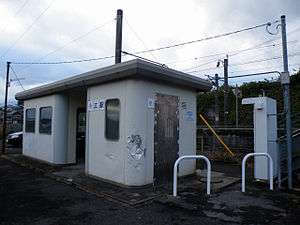Oe Station
Oe Station (小江駅, Oe-eki) is a railway station in Takaki Town, Isahaya, Nagasaki Prefecture, Japan. It is operated by JR Kyushu and is on the Nagasaki Main Line.[1][2]
Oe Station 小江駅 | |
|---|---|
| Railway station | |
 Oe Station in 2008 | |
| Location | Takaki Town, Isahaya-shi, Nagasaki-ken Japan |
| Coordinates | 32°53′29″N 130°06′44″E |
| Operated by | |
| Line(s) | ■ Nagasaki Main Line |
| Distance | 90.9 km from Tosu |
| Platforms | 1 island platforms |
| Tracks | 2 |
| Construction | |
| Structure type | At grade |
| Bicycle facilities | Bike shed |
| Disabled access | No - access to platform by footbridge |
| Other information | |
| Status | Unstaffed |
| Website | Official website |
| History | |
| Opened | 24 March 1934 |
| Traffic | |
| Passengers (FY2014) | 145 daily |
| Location | |
 Oe Station Location within Japan | |
Oe Station has one of the shortest station names in Japan. The others are Ei Station in Kagoshima Prefecture, Ao Station in Hyōgo Prefecture and Ii Station in Yamaguchi Prefecture. Tsu Station of Mie Prefecture has a shorter name in Japanese (it is the only station name written with one kana), but this is not so when romanized.
Lines
The station is served by the Nagasaki Main Line and is located 90.9 km from the starting point of the line at Tosu.[3]
Station layout
The station consists of an island platform two tracks. The station building is a metal cabin and is unstaffed, serving only as a waiting room with an automatic ticket vending machine. Access to the island platform is by means of a footbridge.[3][2]
 A view of the platform and tracks.
A view of the platform and tracks.
History
Japanese Government Railways (JGR) built the station in the 1930s during the development of an alternative route for the Nagasaki Main Line along the coast of the Ariake Sea. In a phase of construction of what was at first called the Ariake West Line, a track was built from Isahaya (on the existing Nagasaki Main Line) north to Yue which opened on 24 March 1934 as the terminus of the track. Oe was opened on the same day as an intermediate station on this stretch of track. A few months later, link up was made from Yue to Tara (which had been extended south from Hizen-Yamaguchi). With through traffic achieved from Hizen-Yamaguchi on the new route to Nagasaki, the entire stretch of track was designated as part of the Nagasaki Main Line on 1 December 1934. With the privatization of Japanese National Railways (JNR), the successor of JGR, on 1 April 1987, control of the station passed to JR Kyushu.[4][5]
Passenger statistics
In fiscal 2014, there were a total of 52,823 boarding passengers, given a daily average of 145 passengers.[6]
Station environs
To the south of the station is the Ariake Sea. Route 207 runs along the coast. Other locations nearby include:
- Takaki Nishi Elementary School
- Isahaya Senior High School, Takaki Branch
- Shinkai Post Office
See also
References
- "JR Kyushu Route Map" (PDF). JR Kyushu. Retrieved 3 March 2018.
- "小江" [Oe]. hacchi-no-he.net. Retrieved 16 March 2018.
- Kawashima, Ryōzō (2013). 図説: 日本の鉄道 四国・九州ライン 全線・全駅・全配線・第5巻 長崎 佐賀 エリア [Japan Railways Illustrated. Shikoku and Kyushu. All lines, all stations, all track layouts. Volume 5 Nagasaki Saga area] (in Japanese). Kodansha. pp. 22, 67. ISBN 9784062951647.
- Ishino, Tetsu; et al., eds. (1998). 停車場変遷大事典 国鉄・JR編 [Station Transition Directory - JNR/JR] (in Japanese). I. Tokyo: JTB Corporation. pp. 222–3. ISBN 4533029809.
- Ishino, Tetsu; et al., eds. (1998). 停車場変遷大事典 国鉄・JR編 [Station Transition Directory - JNR/JR] (in Japanese). II. Tokyo: JTB Corporation. p. 715. ISBN 4533029809.
- "第63版(平成28年)長崎県統計年鑑" [Nagasaki Prefecture Statistics Yearbook 63rd Edition 2016]. Nagasaki Prefectural Government website. Retrieved 16 March 2018. See table at section under Transportation and Communications.
| Wikimedia Commons has media related to Oe Station. |
External links
- Oe Station (JR Kyushu)(in Japanese)